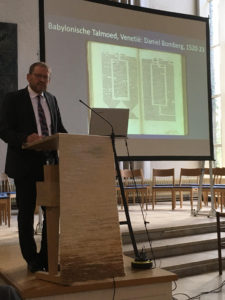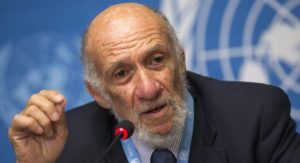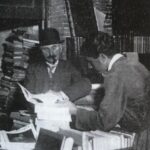Al Jazeera Witness ~ Clifford Bestall ~ Hillbrow: Between Heaven And Hell
Filmmaker Clifford Bestall takes a personal journey to the heart of one of South Africa’s most dangerous neighbourhoods and through the stories of some of its residents reveals a rich seam of today’s urban South African experience.
One Carefree Night
A short documentary shot in South Africa. We follow four teenagers growing up in Manenberg, a suburb of Cape Town, where gangsters roam and drug use is rampant. Lauren-Lee, Ryaad, Cameron and Cohen are among the few teens who still attend school. They hope a high-school diploma will get them out of Manenberg. But there’s another promise that keeps them attending: senior prom. They save up all year to rent a fancy car and to buy ball gowns and tuxedos. The post-exam prom is their Cinderella moment: one magical evening when the dream of escaping their bleak reality seems like it just might come true.
Umberto Eco ~ Ur-Fascism
![]() We must keep alert, so that the sense of these words will not be forgotten again. Ur-Fascism is still around us, sometimes in plainclothes. It would be so much easier, for us, if there appeared on the world scene somebody saying, “I want to reopen Auschwitz, I want the Black Shirts to parade again in the Italian squares.” Life is not that simple. Ur-Fascism can come back under the most innocent of disguises. Our duty is to uncover it and to point our finger at any of its new instances—every day, in every part of the world. Franklin Roosevelt’s words of November 4, 1938, are worth recalling: “I venture the challenging statement that if American democracy ceases to move forward as a living force, seeking day and night by peaceful means to better the lot of our citizens, fascism will grow in strength in our land.” Freedom and liberation are an unending task.
We must keep alert, so that the sense of these words will not be forgotten again. Ur-Fascism is still around us, sometimes in plainclothes. It would be so much easier, for us, if there appeared on the world scene somebody saying, “I want to reopen Auschwitz, I want the Black Shirts to parade again in the Italian squares.” Life is not that simple. Ur-Fascism can come back under the most innocent of disguises. Our duty is to uncover it and to point our finger at any of its new instances—every day, in every part of the world. Franklin Roosevelt’s words of November 4, 1938, are worth recalling: “I venture the challenging statement that if American democracy ceases to move forward as a living force, seeking day and night by peaceful means to better the lot of our citizens, fascism will grow in strength in our land.” Freedom and liberation are an unending task.
In 1942, at the age of ten, I received the First Provincial Award of Ludi Juveniles (a voluntary, compulsory competition for young Italian Fascists—that is, for every young Italian). I elaborated with rhetorical skill on the subject “Should we die for the glory of Mussolini and the immortal destiny of Italy?” My answer was positive. I was a smart boy.
I spent two of my early years among the SS, Fascists, Republicans, and partisans shooting at one another, and I learned how to dodge bullets. It was good exercise.
In April 1945, the partisans took over in Milan. Two days later they arrived in the small town where I was living at the time. It was a moment of joy. The main square was crowded with people singing and waving flags, calling in loud voices for Mimo, the partisan leader of that area. A former maresciallo of the Carabinieri, Mimo joined the supporters of General Badoglio, Mussolini’s successor, and lost a leg during one of the first clashes with Mussolini’s remaining forces. Mimo showed up on the balcony of the city hall, pale, leaning on his crutch, and with one hand tried to calm the crowd. I was waiting for his speech because my whole childhood had been marked by the great historic speeches of Mussolini, whose most significant passages we memorized in school. Silence. Mimo spoke in a hoarse voice, barely audible. He said: “Citizens, friends. After so many painful sacrifices … here we are. Glory to those who have fallen for freedom.” And that was it. He went back inside. The crowd yelled, the partisans raised their guns and fired festive volleys. We kids hurried to pick up the shells, precious items, but I had also learned that freedom of speech means freedom from rhetoric.
Read more: https://web.archive.org/http://www.nybooks.com/articles/ur-fascism/
Kardinaal Willebrandslezing 2018 ~ 5 april 2018 in Bergkerk te Amersfoort
Op 5 april 2018 nodigen de Tilburg University/Katholieke Theologie en de Katholieke Raad van het Jodendom de Algemeen directeur van het Joods Cultureel Kwartier en hoogleraar van de geschiedenis van het Joodse boek aan de UvA, Prof. dr. Emile Schrijver, uit om de jaarlijkse Kardinaal Willebrandslezing te geven met de titel “Identiteit en tradities onder druk”. De coreferenten Prof.dr. Dineke Houtman, hoogleraar Judaica aan de Protestantse Theologische Universiteit en Dr. Bill Banning, docent godsdienst en levensbeschouwing op het d’Oultremontcollege te Drunen, gaan in op de vraag wat christenen van de joodse benadering kunnen leren. Een benadering die allereerst gaat om het doen, het leven volgens de Torah in plaats van de christelijke aanpak van puur doorgeven van het geloof.
Emile Schrijver benadrukt in zijn lezing het grote belang dat het jodendom hecht aan het doorgeven van de joodse leer van generatie op generatie (le dor wa-dor). Schrijver illustreert dat met verschillende citaten en voorbeelden uit de geschiedenis, zoals het volgende citaat uit de Misjna (de eerste neerslag van de mondelinge leer uit de tweede eeuw na de jaartelling): “Mozes ontving de Torah van Sinaï, en gaf haar door aan Jozua; Jozua gaf haar weer door aan de ouden, de ouden aan de profeten; en de profeten leverden haar over aan de mannen van de grote vergadering. Zij hadden drie spreuken: wees voorzichtig met oordelen, vorm veel leerlingen en maak een omheining om de Torah.”
Het einde van de 9de of aan het begin 10de eeuw markeren een nieuwe vorm van overdracht, de codex, naar het gebonden boek, dat het mogelijk maakt om grote teksten door te geven, allereerst voor de overdracht van het Heilige Schrift. Schrijver gaat vervolgens in op de traditionele vorm van een gedrukte bladzijde van de Talmoed, die zich kenmerkt door een centrale tekst die is omgeven door commentaarteksten. ”De oorsprong ligt in de cultuur van discussiëren, bevragen en problematiseren die eigen is aan de joodse cultuur.”
In de loop van de 13e eeuw verschijnen steeds meer handschriften met gecentreerde hoofdteksten en flarden commentaar daaromheen geschreven. Dit wordt de traditie van het ‘open boek’ genoemd, een levende en bewegende traditie. Teksten zijn niet definitief, anderen mogen er nieuw licht op laten schijnen. Deze toevoegingen worden vaak opgenomen in nieuwe versies van de tekst en genieten meestal dezelfde autoriteit als de brontekst. Read more
The Story Of Marcus Garvey ~ A Documentary
Marcus Mosiah Garvey, Jr., ONH (17 August 1887 – 10 June 1940), was a Jamaican political leader, publisher, journalist, entrepreneur, and orator who was a proponent of the Pan-Africanism movement, to which end he founded the Universal Negro Improvement Association and African Communities League (UNIA-ACL). He also founded the Black Star Line, a shipping and passenger line which promoted the return of the African diaspora to their ancestral lands.
Prior to the 20th century, leaders such as Prince Hall, Martin Delany, Edward Wilmot Blyden, and Henry Highland Garnet advocated the involvement of the African diaspora in African affairs. Garvey was unique in advancing a Pan-African philosophy to inspire a global mass movement and economic empowerment focusing on Africa known as Garveyism. Promoted by the UNIA as a movement of African Redemption, Garveyism would eventually inspire others, ranging from the Nation of Islam to the Rastafari movement (some sects of which proclaim Garvey as a prophet).
Garveyism intended persons of African ancestry in the diaspora to “redeem” the nations of Africa and for the European colonial powers to leave the continent. His essential ideas about Africa were stated in an editorial in the Negro World entitled “African Fundamentalism”, where he wrote: “Our union must know no clime, boundary, or nationality… to let us hold together under all climes and in every country…”
The Middle East Is Heating Up ~ Again: An Interview With Richard Falk
The Middle East is heating up again, in part due to President Trump’s decision to recognize Jerusalem as Israel’s capital. The Trump administration has also incited upset with its unconditional support for Israel’s aggressive policies, which violate basic principles of international law and threaten the region with the eruption of military confrontations. For an assessment of the latest developments in the Middle East, C.J. Polychroniou spoke to Richard Falk, a professor emeritus of international law at Princeton University, former UN special rapporteur for Palestinian human rights and author of scores of books and hundreds of academic articles on international relations and international law.
C.J. Polychroniou: Richard, let’s start with Donald Trump’s decision to officially recognize Jerusalem as Israel’s capital and to move the US embassy there by May of this year. First, is this legal from the standpoint of international law, and second, what are likely to be the long-term effects of the US recognition of Jerusalem as Israel’s capital on the region as a whole?
Richard Falk: There is no question that Trump’s Jerusalem policy relating to recognition and the move of the American embassy is provocative and disruptive, underscoring the abandonment by Washington of even the pretense of being a trustworthy intermediary that can be relied upon by both sides to work for a sustainable peace between the two peoples. Some critics of the initiative are saying that the US is free to situate its embassy in Jerusalem, but it isn’t Israel, as the status of the city is undetermined and East Jerusalem, where the “Old City” is located, is considered to be an “occupied territory” in international humanitarian law.
Recognition of Jerusalem as the capital of Israel is a clear violation of international humanitarian law, which rests on the central proposition that an occupied territory should not be altered in any way that changes its status and character without the consent of the occupied society. It also is a unilateral rejection of a near universal consensus, endorsed by the United Nations, that the future of Jerusalem should be settled by negotiations between the parties as a part of a broader peacemaking process. Israel had already violated both international law and this international consensus by annexing an enlarged Jerusalem, and declared that the whole city, within expanded boundaries, would be the “undivided, eternal capital” of Israel. It is notable that the UN General Assembly on December 21, 2017, approved by an overwhelming majority of 128-8 (35 abstentions) a strong condemnation of the US move on Jerusalem, with [the US’s] closest allies joining in this vote of censure.
It is difficult to predict the long-term consequences of this diplomatic rupture. It depends, above all, on whether the US government manages to restore its claim to act as a conflict-resolving intermediary. The Trump administration continues to insist that it is working on a peace plan that will require painful compromises by both Palestine and Israel. Of course, given the unconditional alignment of Washington with Prime Minister Benjamin Netanyahu’s Israel, and the orientation of those entrusted with drafting the plan, it is highly unlikely that even President Mahmoud Abbas and the Palestinian Authority will be inclined to enter a diplomatic process that is virtually certain to be weighted so heavily in favor of Israel. Yet as many have come to appreciate, nothing is harder to predict than the future of Middle Eastern politics. At the same time, Jerusalem has an abiding significance for both Islam and Christianity that makes it almost certain for the indefinite future that there will be formidable regional and international resistance to subsuming Jerusalem under Israeli sovereign control.
Israel appears bent on restricting Iran’s rising influence as a regional power in the Middle East. How far do you think the US can go in assisting Israel to contain Tehran’s strategy for empowering Shias?
Israel and Saudi Arabia are both, for different reasons, determined to confront Iran, and quite possibly, initiate a military encounter with widespread ramifications for the entire region, if not the world. A quick glance at the Syrian conflict suggests how complex and dangerous is this effort to destabilize the Iranian governing process, with the dual objectives of destabilizing the governing process mixed with the more ambitious goal of causing civil strife of sufficient magnitude as to produce a civil war, and ideally, regime change.
The Israeli adherence to this recklessness seems partly motivated by its overall security policy of seeking to weaken any country in the region that is hostile to its presence and has the potential military capability to threaten Israeli security in a serious manner. Israel has been so far successful in neutralizing each of its credible adversaries in the region (Saudi Arabia, Egypt, Syria) with the exception of Iran. In this sense, Iran stands out as the last large unfinished item on Israel’s geopolitical agenda. The question of Israel’s real intentions [is] hard to pin down, as the alleged Iranian threat is also frequently manipulated by Netanyahu and other Israeli leaders to mobilize domestic support for sticking with an aggressive foreign policy. In this latter context, Israeli security specialists express an appreciation of the risks of an actual military confrontation with Iran. Read more
- Page 2 of 2
- previous page
- 1
- 2




